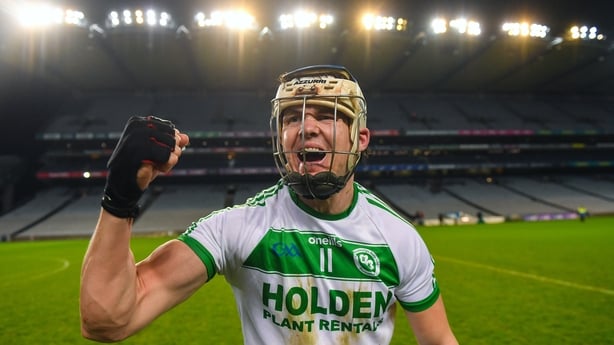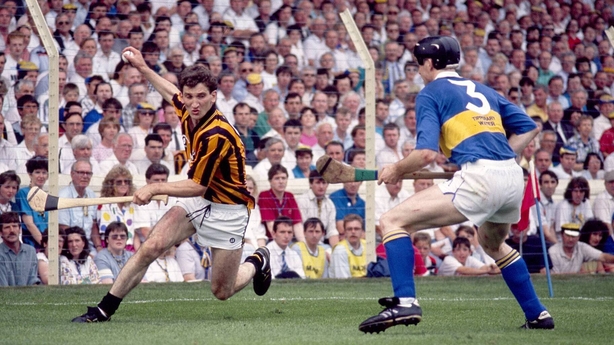Ballyhale Shamrocks don't appear like they require much external motivation to go out and win hurling matches but were provided with some this year anyway.
Last year's loss to Ballygunner was unusually sickening. A first ever three-in-a-row (albeit it would have been achieved over four years) was in their grasp before Harry Ruddle sauntered into a chasm of space, drilling home a dramatic winner for the Waterford champions at the death.
It was rare territory for Ballyhale, only their second All-Ireland final loss in 10 appearances and their first defeat in a decider since their first ever showing in 1979, when Knocktopher's own Frank Cummins was part of a Blackrock side which pipped them in a goal-fest.
Colin Fennelly was sufficiently annoyed by Barry Coughlan's victory speech that he took the rare step of providing the GAA press with some headlines out of it.
"Like, literally we robbed it today, you know," Coughlan announced from the Hogan Stand last February. "I suppose ye have done that to other teams, so I suppose if it goes around, it comes around."
Notwithstanding Coughlan's subsequent comment that he "meant that with full respect", the Shamrocks players felt disrespected.
Fennelly felt it keenly enough to bring it up ahead of last month's return meeting in the All-Ireland semi-final.
"Their speech at the end of the game, it's not something you want to hear. You want that little bit of respect but, look, we'll keep our heads down," Fennelly told reporters, in a slight departure from the usual straight bat approach at these events.
Six days before Christmas, while most of the rest of the world had their heads turned by events in Lusail, Ballyhale gained their revenge against the reigning champions. The game was tit-for-tat until TJ Reid's 49th minute penalty, which opened up a gap that the Shamrocks maintained until the finish.

It was a sweet victory for the eight-time All-Ireland champions, who are roaring hot favourites to claim a ninth title on Sunday. And after that, 'La Decima' will loom into the horizon.
The Ballygunner captain didn't exactly pluck his observation out of nowhere.
Ballyhale had twice salvaged games in the dying seconds in the 2021-22 season, against St Rynagh's in the Leinster semi-final and then against St Thomas' in the All-Ireland semi.
Though not firing on all cylinders in 2021-22, Ballyhale had evolved such a winning habit and such an aura that they were capable of rescuing games where they seemed to all intents beaten.
A classic trait of the trophy-laden overdog. In a tussle between Ballyhale and Ballygunner - a sizable club in Waterford city - it should be the latter who is the oppressor, the former the heartwarming underdog. Yet the reverse is true.
How did such a relatively small rural club evolve such an aura?
Formed out of a merger of two small intermediate clubs with no prior history of success in the early 1970s, All-Ireland victories for the Shamrocks have become almost the default outcome in the club championship.
In the early 1970s, a couple of years after the All-Ireland club was established, Kilkenny county board moved to tidy up their club arrangements along a 'one parish, one club' model. Ballyhale and Knocktopher pooled resources, with nearby Knockmoylan, defunct as a hurling entity since the late '50s, joining in.
"There was a glut of hurlers in the area but we had two clubs in the parish hurling against one another," Michael Fennelly Snr told RTÉ Sport in 2020. "It probably wasn't going to work out. And we were losing a lot of hurlers as well."
Ballyhale native and hurling writer PM O'Sullivan has already explained how the area had in fact a strong tradition of hurling achievement, albeit one which was "slightly submerged".
Practically every All-Ireland winning Kilkenny side has had at least one representative from the area on the field - with the exception of 1993, and even then Paul Phelan was a sub.
Stronger hurlers from Ballyhale tended to represent the nearby Carrickshock club and formed the backbone of the side which won seven Kilkenny SHC titles in the 1930s and 40s.
Finally established in 1972, the new club didn't have many teething problems. They arrived fully-formed as a trophy machine. Born aristocrats.
They swept to a junior title in '73, then the intermediate in '74. They had to wait until 1978 to win their first senior title - which in Fennelly Snr's estimation was pure foot-dragging ("there were players playing soccer and doubling up sports") - after which a provincial title arrived at the first attempt.
Their success has come in two extremely prolonged waves. They established their first dynasty in Kilkenny in the 1980s, racking up nine senior titles in 14 seasons between 1978 and 1991.
They mined three All-Ireland titles in this period, preventing a St Finbarr's double in 1981 and in the process seeing off the Cork city trio which had dominated the club championship in its first decade.
Three years later, a second All-Ireland title arrived after a replay against Gort - who boasted Sylvie Linnane in their ranks. In their first two All-Ireland final wins, every one of their scores arrived courtesy of chaps called Fennelly.

By 1990, other families had chipped in on the scoring front, Shefflins, Masons and Lawlers in the mix as they dispatched Ballybrown in the final, their first win at Croke Park.
The continuity in surnames from one winning generation to the next indicates the tightness of the community. In this, there are similarities with their opponents this weekend, Dunloy, with sons of the crop that reached back-to-back finals in the mid-90s lining out in the decider.
Their success is a repudiation of the notion that the future is the preserve of urban super clubs. Though there are exceptions - it's harder to find a smaller club than Kilcoo - hurling is perhaps more resistant to the super club phenomenon.
The game's more bespoke and intricate set of skills mean it's less a case of bringing numbers and resources to bear on the competition. The bias in favour of straightforward athleticism in lesser than in football. Culture is more important, thus the game's traditional heartlands remain dominant.
Last year Ballyhale went level with Tullaroan in the Kilkenny roll of honour - and the latter has only added one title to their tally in the past 60 years (in 1994). Another All-Ireland title will leave them with officially more than double the next closest in the national stakes, Birr and Portumna jointly holding four titles.
The Shamrocks are very much the Kilkenny of Kilkenny at this point, and infused with the same spirit of humility and relentlessness of their county team.
As O'Sullivan noted before, quoting former All-Ireland winning manager Andy Mahoney, "there's nowhere in the parish where you see all the winning teams up on the wall."
In Ballyhale and Knocktopher, the most important title is always the next one, of which there may well be another by the end of today.


